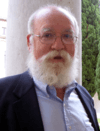Breaking the Spell: Religion as a Natural Phenomenon
 | |
| Author | Daniel C. Dennett |
|---|---|
| Country | United States |
| Language | English |
| Subject | Psychology of religion |
| Publisher | Viking (Penguin) |
Publication date | 2006 |
| ISBN | 978-0-14-303833-7 |
| OCLC | 61240665 |
| 200 22 | |
| LC Class | BL2775.3 .D46 2006 |
| Preceded by | |
Breaking the Spell: Religion as a Natural Phenomenon is a 2006 book in which the American philosopher and cognitive scientist Daniel Dennett argues that religion is in need of scientific analysis so that its nature and future may be better understood. The "spell" that requires "breaking" is not religious belief itself but the belief that it is off-limits to or beyond scientific inquiry.
Synopsis
The book is divided into three parts. Part I discusses the motivation and justification for the entire project: Can science study religion? Should science study religion? After answering in the affirmative, Part II proceeds to use the tools of evolutionary biology and memetics to suggest possible theories regarding the origin of religion and subsequent evolution of modern religions from ancient folk beliefs. Part III analyzes religion and its effects in today's world: Does religion make us moral? Is religion what gives meaning to life? What should we teach the children? Dennett bases much of his analysis on empirical evidence, though he often points out that much more research in this field is needed.
Dennett's working definition of religions is: "social systems whose participants avow belief in a supernatural agent or agents whose approval is to be sought." He notes that this definition is "a place to start, not something carved in stone."
Critical reception
Generally, the book was well received, with The Guardian's Andrew Brown describing it as giving "a very forceful and lucid account of the reasons why we need to study religious behaviour as a human phenomenon".[1] In Scientific American, George Johnson describes the book's main draw as being "a sharp synthesis of a library of evolutionary, anthropological and psychological research on the origin and spread of religion."[2] Finally, in The New Yorker, H. Allen Orr described the book as "an accessible account of what might be called the natural history of religion."[3]
However, in The New York Times, Leon Wieseltier called the book "a sorry instance of present-day scientism" and "a merry anthology of contemporary superstitions."[4] Additionally, Charles T. Rubin, in the The New Atlantis, likened Dennett to "a tone-deaf music scholar", criticized his "unwillingness to admit the limits of scientific rationality" and accused him of "deploying the same old Enlightenment tropes that didn’t work all that well the first time around."[5]
Translations
Breaking the Spell has been translated into several other languages, including:
| Language | Title | Translator/s | Publication | ISBN |
| Dutch | De betovering van het geloof: religie als een natuurlijk fenomeen | Hans Bosman | Amsterdam: Contact 2006 | ISBN 9025426875 |
| Finnish | Lumous murtuu: uskonto luonnonilmiönä | Kimmo Pietiläinen | Helsinki: Terra Cognita 2007 | ISBN 978-952-5202-96-0 |
| German | Den Bann brechen. Religion als natürliches Phänomen | Frank Born | Frankfurt a. M.: Verlag der Weltreligionen im Insel Verlag 2008 | ISBN 978-3-458-71011-0 |
| Greek | Απομυθοποίηση | Dimitris Xygalatas Nikolas Roubekas | Thessaloniki: Vanias 2007 | ISBN 978-960-288-198-9 |
| Italian | Rompere l'incantesimo. La religione come fenomeno naturale | S. Levi | Milano: Cortina Raffaello 2007 | ISBN 978-88-6030-097-3 |
| Polish | Odczarowanie. Religia jako zjawisko naturalne | Barbara Stanosz | Warsaw: Państwowy Instytut Wydawniczy 2008 | ISBN 978-83-06-03138-6 |
| Portuguese | Quebrando O Encanto. A Religião Como Fenômeno Natural | Helena Londres | Rio de Janeiro: Globo 2006 | ISBN 978-85-250-4288-0 |
| Spanish | Romper el hechizo: la religión como un fenómeno natural | Felipe de Brigard | Madrid: Katz 2007 | ISBN 978-84-96859-00-5 |
See also
- Religious studies
- Evolutionary psychology of religion
-
- Similar / related books: Religion Explained
- Darwin's Cathedral
- The End of Faith
- The God Delusion
- God is Not Great
References
- ↑ Brown, A., (2006). Beyond belief. The Guardian. Available to: http://www.theguardian.com/books/2006/feb/25/highereducation.news3. [Accessed 25/07/2015]
- ↑ "Getting a Rational Grip on Religion", Scientific American, December 25, 2005.
- ↑ "The God Project", The New Yorker, April 3, 2006.
- ↑ "The God Genome", The New York Times, February 19, 2006.
- ↑ "The God Meme" Archived March 13, 2013, at the Wayback Machine., The New Atlantis 12 (Spring 2006).
External links
| Wikiquote has quotations related to: Breaking the Spell |
- "Breaking the Spell" panel, an audio recording and transcript of a discussion involving Daniel Dennett and Alister McGrath organized by the Royal Society of Arts.
Reviews
- David B. Hart, "Daniel Dennett Hunts the Snark" in First Things.
- George Johnson, "Getting a Rational Grip on Religion" in Scientific American.
- Leon Wieseltier, "The God Genome" in The New York Times.
- Adam Kirsch, "If Men Are From Mars, What's God" in The New York Sun.
- James Brookfield, "Dennett’s dangerous idea", World Socialist Website.
- Armin W. Geertz, "How Not to Do the Cognitive Science of Religion Today" (University of Aarhus seminar paper).
- Charles T. Rubin, "The God Meme" in The New Atlantis.
